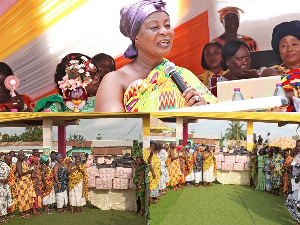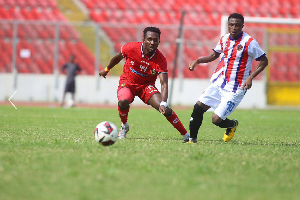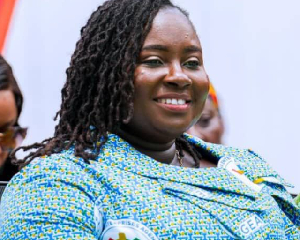The Executive Director of Obaapa Development Foundation (ODF), Nana Hemaa Awindor, has called on the government and other stakeholders, as a matter of urgency, to prioritize the well-being of young female students concerning their menstrual hygiene.
Expressing concern over how some young female students are abused, raped, and impregnated due to the lack of logistics for menstrual hygiene, she said there was a need to pay attention to those vulnerable pupils, especially those in rural areas.
According to her, adolescent females, especially school-going ones, miss classes due to their inability to access sanitary pads during menstruation.
She has therefore implored the government and other relevant stakeholders to consider equipping schools with free sanitary pads to ensure female students attend classes and enable them to compete with their male colleagues.
Nana Hemaa Awindor reiterated that there were situations where parents got irritated when their children asked them for sanitary pads, to the extent that they (the parents) beat their wards.
“Do you know that children are abused these days because of sanitary pads? Children don't go to school because of the fear of dripping or the fact that they don't have enough facilities or logistics when they are having their periods,” she revealed, appealing to stakeholders in education to bring relief to the school girls who find themselves in this situation.
The ODF Executive Director, who doubles as the Nkosuohemaa of Afigya Kwabre, was speaking at the climax of a week-long Menstrual Hygiene Day celebration at Kentinkyiren in the Atwima Kwanwoma District of the Ashanti Region, during an advocacy program with the indigenes concerning menstrual hygiene and Gender-Based Violence (GBV).
With support from Amnesty International, she provided over 1,500 pieces of sanitary pads to the female children who attended the event and partner schools as well as churches within the district.
She stated that there was a need to educate Ghanaians on menstruation for them to know that it was normal and natural but not the fault of a female to experience it periodically.
“It is very important that we continue the education and get it down to the people so that we would all take very good care of ourselves. We instituted the "sanitary pad bank" last year at the various schools after giving out sanitary pads to them and the Ghana Education Service (GES) excitingly have taken it up as a project. It started with giving each school a box of sanitary pads (about 96 pieces) which was given by UNFPA and we want to appreciate them for their initiative,” she added.
Nana Hemaa Awindor expressed her excitement that the GES this year has instituted that all schools have a sanitary pad bank in their school. This, she explained, would prepare for unaware and impromptu menstruations and also make provisions for others that may be in need of the pads.
On her part, Mrs. Doris Ofori, who is the district education director of Atwima Kwanwoma, commended the Obaapa Development Foundation for the wonderful work they continue to do for the holistic development and empowerment of the youth, most especially, the adolescent girls in the district.
The partnership between the District Education Directorate and Obaapa Development Foundation, she disclosed, had yielded lots of results over the period.
Among the achievements she enumerated were that school girls at all levels and women in our schools and communities within the district have been more empowered and enlightened to deal with menstrual hygiene and its related issues comfortably.
She added that through the awareness and sensitization programs, all schools were to create and set up Pad Banks which will influence the punctuality and regularity of girls to school since their needs are taken care of during menstrual periods.
Mrs. Ofori also noted that schools in deprived areas in the district have received sponsorship packages to set up Life Pad Banks, where materials for the management of menstruation will always be available in such schools for the girls.
She said, that through the partnership with ODF, the directorate had lots of girls, women, and even men doing advocacies in the form of support, encouragement, sponsorships, and sensitizations on the benefits and advantages of proper menstrual hygiene management practices.
This, she explained, had become a daily routine and regular activity among girls, women, and men in our schools and communities.
“Through this partnership, officers, headteachers, and teachers, as well as the learners and students, have built strong links with prominent people in the country. There has been a very good cordial rapport among stakeholders, such as traditional and religious leaders, headteachers and teachers, educationists, technocrats, politicians, and many others that you all can add to the list,” she concluded.
Nana Boa Amponsem, the Kontihene Abusuapanin of Kentinkyiren, also gave a sounding testimony of how impactful last year’s menstrual hygiene week celebration had been on him.
“The church visit and durbar gave me the platform to gain deeper insight and knowledge on menstrual hygiene management and how to support my girls during those times. I now understand and feel comfortable during such periods and make sure some of the menstrual hygiene products are available before the period starts,” the traditional ruler shared, thanking ODF and Nana Hemaa Awindor for their education.
There were other personalities and representatives who gave their goodwill messages. Among them were Unity Queens Ghana, Amnesty International Ghana, Regional Education Directorate, CHRAJ, Marie Stopes Ghana, and many others.
Regional News of Thursday, 6 June 2024
Source: Nana Peprah, Contributor

















